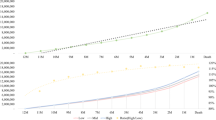Abstract
Background
Few reports have thus far discussed the influence of economic factors on treatment decision-making by patients. The objective of the present study was to clarify the awareness among oncologists of health economics in cancer treatment.
Methods
The present study was based on the questionnaire regarding health economics in cancer treatment carried out by the Japan Society of Clinical Oncology (JSCO) in July 2013. The subjects were trustees registered with JSCO. The survey investigated the influence of medical expenses on patient access to and selection of medical treatment in order to clarify the primary attributes of the respondents and their awareness of economics. The study also investigated the maximum allowable public medical expenses to prolong the life expectancy of a cancer patient by 1 year and the factors that can influence treatment selection.
Results
The 172 respondents had completed a mean of 30.3 ± 6.2 postgraduate years, and the mean number of patients they treated annually was 1323 ± 1963. The degree of treatment accessibility among patients was perceived positively by 112 (71.3 %) and negatively by 49 (28.7 %) of the respondents, irrespective of medical expenses. Of the 172 respondents, 66 (41.0 %) believed that the maximum allowable medical expenses for cancer treatment should be ≤4 million yen/LY, with 62 (39.8 %) reporting a value of 4.01–8 million yen/LY.
Conclusion
The findings of this study suggest that a certain range of medical expenses has come to be regarded as the standard range of medical expenses for cancer treatment among oncologists, with answers based on the premise that patients should have access to effective medical treatment.



Similar content being viewed by others
References
Iwamoto Y (2008) Tax and insurance premiums as financial resources for social security. Research Institute of Economy, Trade and Industry (RIETI), Tokyo, pp 1–25
Jones J, Takeda A, Picot J et al (2009) Lapatinib for the treatment of HER2-overexpressing breast cancer. Health Technol Assess 13:1–6
Kato K (2011) Pharmacoeconomic analysis of the chemotherapy for metastatic colorectal cancer patients. J Clin Surg 66(1):54–59
Ministry of Health, Labour and Welfare (2012) Overview of national health expenditures. http://www.mhlw.go.jp/toukei/saikin/hw/k-iryohi/12/
Kozminski MA, Neumann PJ, Nadler ES et al (2011) How long and how well: oncologists’ attitudes toward the relative value of life-prolonging v. quality of life-enhancing treatments. Med Decis Mak 31(3):380–385
Malin JL, Weeks JC, Potosky AL et al (2013) Medical oncologists’ perceptions of financial incentives in cancer care. J Clin Oncol 31(5):530–535
Rokuro K (2010) Data health plan by the Japan Health Insurance Association (major diseases by annual health expenditure class and percent distribution of medical care expenditure). Japan Health Insurance Association, Tokyo. http://tokuteikenshin-hokensidou.jp/interview/003/0903_2.pdf
Takahashi K (2015) Selection of cancer treatment method, 3rd edn. Yomiuri Shimbun (Morning), Tokyo, pp 9
American Family Life Assurance Company of Columbus (2011) Opinion survey on cancer. http://www.aflac.co.jp/news_pdf/201104262.pdf
Neumann PJ, Palmer JA, Nadler E et al (2010) Cancer therapy costs influence treatment: a national survey of oncologists. Health Aff (Millwood) 29(1):196–202
Ward S, Pilgrim H, Hind D (2009) Trastuzumab for the treatment of primary breast cancer in HER2-positive women: a single technology appraisal. Health Technol Assess 13:1–6
Wong YN, Hamilton O, Egleston B et al (2010) Understanding how out-of-pocket expenses, treatment value, and patient characteristics influence treatment choices. Oncologist 15(6):566–576
Merrill JM (1991) Access to high-tech health care. Ethics Cancer 67(6 Suppl):1750–1752
Takura T (2014) State-of-the-art medicine as industrial policy. Hospitals 73(7):528–533
Acknowledgments
The authors would like to express their deep appreciation to all trustees of JSCO for their cooperation in this study.
Funding
This research was supported and funded by the 51st Annual Meeting of the Japan Society of Clinical Oncology.
Author information
Authors and Affiliations
Corresponding author
Ethics declarations
Conflict of interest
The authors declare that they have no conflict of interest.
About this article
Cite this article
Takura, T., Fujiya, M., Shimada, Y. et al. Perspectives of Japanese oncologists on the health economics of innovative cancer treatments. Int J Clin Oncol 21, 633–641 (2016). https://doi.org/10.1007/s10147-015-0932-2
Received:
Accepted:
Published:
Issue Date:
DOI: https://doi.org/10.1007/s10147-015-0932-2




